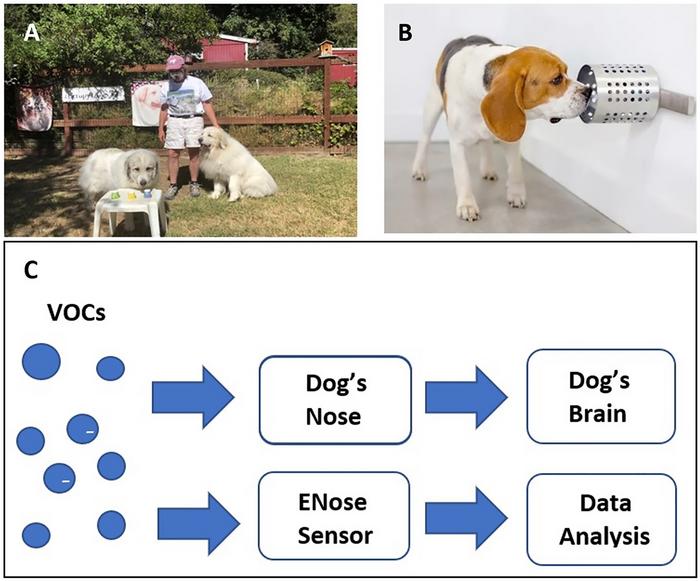Scent dogs may represent a cheaper, faster and more effective way to detect COVID-19, and could be a key tool in future pandemics, a new review of recent research suggests. The review, published in De Gruyter’s Journal of Osteopathic Medicine, found that scent dogs are as effective, or even more effective, than conventional COVID-19 tests such as RT-PCR.

Credit: Photo credits: (A) Todd Dickey, (B) Heather Junqueira, (C) Flowchart modified after Karakaya et al. with permission (Karakaya, D, Ulucan, O, Turkan, M. Electronic nose and its applications: a survey. Int J Autom Comput 2020;17:179-209. https//doi:10.1007/s11633-019-1212-9).
Scent dogs may represent a cheaper, faster and more effective way to detect COVID-19, and could be a key tool in future pandemics, a new review of recent research suggests. The review, published in De Gruyter’s Journal of Osteopathic Medicine, found that scent dogs are as effective, or even more effective, than conventional COVID-19 tests such as RT-PCR.
Dogs possess up to 300 million olfactory cells, compared to just 5 or 6 million in humans, and use one-third of their brains to process scent information, compared with just 5% for humans. Dogs trained to recognize specific volatile organic compounds created in the body during disease have successfully identified patients with certain cancers, Parkinson’s and diabetes.
Prof. Tommy Dickey of the University of California, Santa Barbara and Heather Junqueira of BioScent Detection Dogs reviewed 29 studies where dogs were used to detect COVID-19. The studies were performed using over 31,000 samples by over 400 scientists from more than 30 countries using 19 different dog breeds. In some studies, the scent dogs sniffed people directly, sometimes in public places as a health screening. In others, the dogs sniffed patient samples such as sweat, saliva or urine samples.
In the majority of studies, the scent dogs demonstrated similar or better sensitivity and specificity than the current gold-standard RT-PCR tests or antigen tests. In one study, four of the dogs could detect the equivalent of less than 2.6 x 10−12 copies of viral RNA per milliliter. This is equivalent to detecting one drop of any odorous substance dissolved in ten and a half Olympic-sized swimming pools and is three orders of magnitude better than modern scientific instruments.
The dogs could detect COVID-19 in symptomatic, pre-symptomatic and asymptomatic patients, along with new COVID variants and even long COVID. A major benefit of using the dogs was their speed – they could provide a result in seconds to minutes, and did not require expensive lab equipment or create mountains of plastic waste, unlike conventional diagnostic approaches.
“Although many people have heard about the exceptional abilities of dogs to help humans, their value to the medical field has been considered fascinating, but not ready for real-world medical use,” said Prof. Dickey. “Having conducted this review, we believe that scent dogs deserve their place as a serious diagnostic methodology that could be particularly useful during pandemics, potentially as part of rapid health screenings in public spaces. We are confident that scent dogs will be useful in detecting a wide variety of diseases in the future.”
Prof. Dickey and Heather Junqueira added that they feel that the impressive international COVID scent dog research described in their paper, perhaps for the first time, demonstrates that medical scent dogs are ready for mainstream medical applications.
Journal
Journal of Osteopathic Medicine
DOI
10.1515/jom-2023-0104
Method of Research
Literature review
Subject of Research
Not applicable
Article Title
COVID-19 scent dog research highlights and synthesis during the pandemic of December 2019−April 2023
Article Publication Date
17-Jul-2023
COI Statement
Heather Junqueira is the owner of BioScent, Inc.




